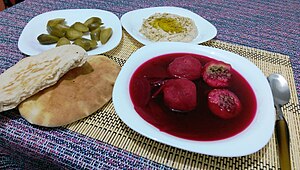


A bowl of red kubbeh in a beet broth.
| |
| Alternative names | Kubbe, kubeh, chamo kubbeh, chamo kubbe, adom kubbeh, hamusta kubbeh |
|---|---|
| Type | Soup/dumpling |
| Course | Main dish |
| Place of origin | Iraq |
| Region or state | Mesopotamia |
| Serving temperature | Hot |
| Main ingredients | Coarse semolina, water, olive oil, salt, ground beef, vegetables |
| Variations | Kubbeh Khamo (yellow kubbeh), Kubbeh Khamusta (sour kubbeh), Kubbeh Adouma (red/beet kubbeh), Kubbeh Bamia (with okra and tomato paste), Kubbeh Za'atar (with hyssop and lemon juice). |
Kubbeh, also known as kubbe,[1][2] is a family of dishes of Iraqi Jewish, and Assyrian[1] origin that are also popular in the Levant, and consist of a filled dumpling soup, with a wide array of fillings and soup broths. Once almost exclusively made at home by members of the Iraqi and Assyrian communities, since the early 20th century the popularity of the dish has expanded to Israelis of all backgrounds. It is commonly served in restaurants across Israel, most notably in the Machane Yehuda market in Jerusalem.[3][4][5][6][7][8]
The term kubbeh is also used in some countries to refer to kibbeh, a type of paste made of bulgur and meat that is used in a variety of regional dishes.
|
| |
|---|---|
| History |
|
| Types |
|
| Religious dietary laws and related terms |
|
| Chefs |
|
| Religious foods |
|
| Ashkenazi breads |
|
| Sephardi and Mizrahi breads |
|
| Ethiopian Jewish breads |
|
| Bagels and similar breads |
|
| Pancakes |
|
| Cakes and other desserts |
|
| Cookies |
|
| Pastries |
|
| Fried foods |
|
| Dumplings, pastas and grain dishes |
|
| Casseroles and savory baked dishes |
|
| Snacks and other baked goods |
|
| Sandwiches |
|
| Egg dishes |
|
| Meat dishes |
|
| Fish dishes |
|
| Salads and pickles |
|
| Vegetable dishes |
|
| Soups and stews |
|
| Cheeses and other dairy products |
|
| Condiments, dips and sauces |
|
| Beverages |
|
| Herbs, spices and seasonings |
|
| Related lists |
|
| |
|
| |
|---|---|
| History |
|
| Fruits and vegetables |
|
| Other ingredients |
|
| Cheeses |
|
| Breads |
|
| Salads |
|
| Pasta |
|
| Fish |
|
| Soups |
|
| Meat |
|
| Sandwiches |
|
| Dips and condiments |
|
| Grains and side dishes |
|
| Fried foods |
|
| Desserts |
|
| Alcohol |
|
| Other drinks |
|
| Israeli restaurants domestically and abroad |
|
This Jewish cuisine–related article is a stub. You can help Wikipedia by expanding it. |
This Turkish cuisine-related article is a stub. You can help Wikipedia by expanding it. |